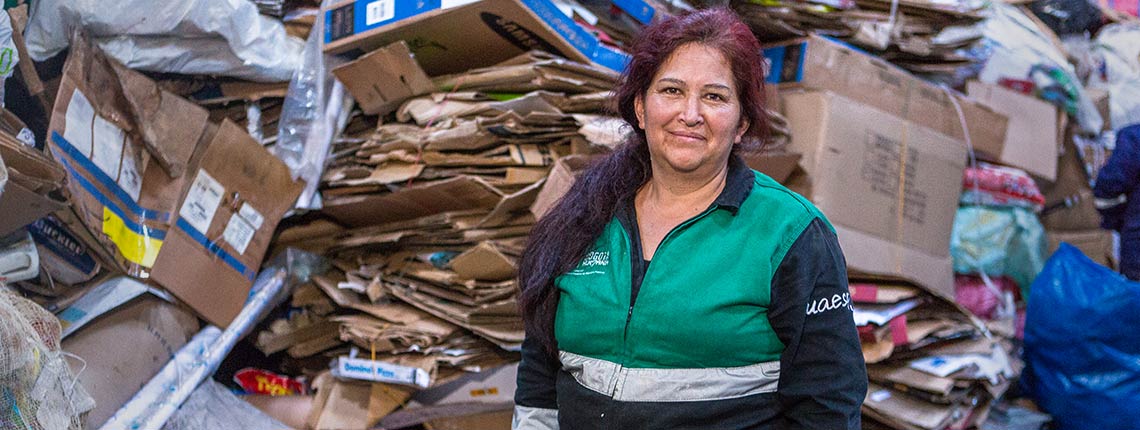In promoting a better urban future, the United Nations recently called for the sharing of transformative approaches to local action – what has worked to create “greener, more equitable and sustainable cities”. Here are five examples from the rich experiences of WIEGO and our partners.
❶
Centring waste pickers in municipal waste management: A people-centred approach in Colombian cities
In Bogotá, and many other Colombian cities, waste pickers have been formally included as providers of recycling public waste management services. This was achieved through a 30-year struggle by the Waste Pickers Association of Bogotá (ARB) and the National Waste Pickers Association (ANR). Though the specifics of the systems vary according to the city, in essence, waste picker organizations that undertake formalization can provide – and receive payment for – collecting, transporting and preparing recyclable materials. Payment for these services complements the money they make from selling recyclable materials.
❷
Subverting master planning as a tool for inclusion: The “I, Too, Am Delhi” campaign
Master plans across the Global South tend to reflect Eurocentric, modernist city visions that are disconnected from the lived reality of most people, who live and work informally. In Delhi, previous master plans were used to legally justify the displacement of poor communities from their homes and workplaces. Over the last three years, WIEGO’s Focal Cities Delhi team supported the formation of a diverse coalition of civil society groups, activists and informal workers’ organizations. Together, the campaign has advanced a more just and inclusive “people’s plan” for Delhi for the next 20 years. This experience holds lessons for activists and progressive planners in how to use master planning as a tool of inclusion and recognition for informal livelihoods in city planning.
Read more about a people’s campaign in Delhi.
❸
Supporting livelihoods through slum upgrading: Lessons from the Mahila Housing SEWA Trust in Ahmedabad
The Mahila Housing SEWA Trust (MHT) has been working to improve the quality of habitats in poor informal settlements in Indian cities for more than 25 years. MHT’s interventions range from promoting household access to water and sanitation at scale, improved design and layout of homes to accommodate specific work and storage needs, advocating for tenure in Delhi’s resettlement colonies and, more recently, advocating for better and safer transport connectivity to poor settlements in Ahmedabad. All have had wide-ranging impacts on the wellbeing and economic productivity of home-based workers. City Collab, an Ahmedabad-based consulting firm, has produced aresources to distil the lessons learned from MHT.
Learn more about how to make home-based work environments safer, healthier and more productive.
❹
Harmonizing the right to mobility and the right to livelihood: Lessons from Mexico City
In Mexico City is a transit junction – CETRAM Tacubaya – where informal food vendors share space with pedestrians, commuters, cyclists and buses. WIEGO and ITDP-Mexico (Institute for Transportation and Development Policy) used the junction as a case study to develop guidelines and design proposals for facilitating safe and secure work for street vendors, as well as for ease of transportation and mobility for pedestrians. The study involved focus groups with vendors and extensive field work at the site. From it, WIEGO and ITDP-Mexico developed a toolbox that outlines principles for harmonizing the right to work in public space with the right to urban mobility.
Learn more about work in public space and mobility (in Spanish).
❺
Designing public space to support street and market trading: Asiye eTafuleni’s approach in Durban
In Durban, South Africa, non-profit organization Asiye eTafuleni has worked alongside traders in designing infrastructure for public-space trading since 2008. Their approach suggests that before intervening, urban practitioners need to conduct a thorough contextual analysis. Asiye eTafuleni uses critical observation, individual and focus group interviews, and encourages traders to do their own research. The organization, based in the inner city, has identified different trading patterns and typologies with associated planning and design implications and offers this and other tools for urban practitioners to apply.
Read more about inclusive public-space planning and design.

